Jason Bourne Review
"Certainly not Bourne again"
2007's
The Bourne Ultimatum perfectly rounded a fantastic series of movies, but Hollywood being Hollywood will keep a series going until it runs dry. Universal already tried to continue the series without the title character with
The Bourne Legacy, a continuation in the dumbest way possible - the idea of special pills making someone super smart would have been more fitting in an
American Dad episode. Now Universal has brought back Matt Damon and director Paul Greengrass to continue the series.
Jason Bourne picks up 12 years after the events of the original series. Jason Bourne (Damon) has been living off the grid, hiding in Greece as a bare-knuckle boxer. Nicky Parsons (Julia Stiles) has become a hacker for free speech activist Christian Dassault (Vinzenz Kiefer). Her hacking leads to the discovery of the CIA's new black ops division, Ironhand, making the rogue agents a target once again.
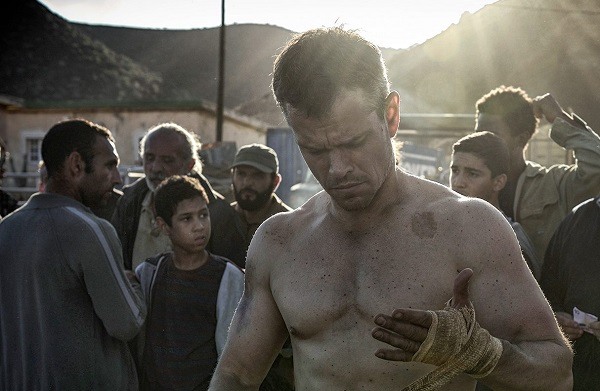
Greengrass once joked that if he did return to the
Bourne series it should be called 'The Bourne Redundancy' because there was nowhere the series could go after 'Ultimatum'. There is some truth to that statement because
Jason Bourne was a rehash of the previous
The Bourne Trilogy. This time Greengrass worked as the co-writer as well director, replacing Tony Gilroy, but the British filmmaker continues with the same themes of Bourne trying to regain his memory and feeling guilty about the actions he has performed - being forced back into the world of espionage despite his protestation and stopping the CIA going beyond its remit to 'protect' America.
Jason Bourne also borrows plot points from the previous movies, like a tragic event that motives Bourne and
Alicia Vikander's character of Heather Lee - the head of Cyber Ops being similar to Joan Allen's Pamela Landy, including her character progression. It all helps strike a narrative that the series has run out of ideas and there are no new ideas for progression. The focus on Bourne - and his attempt to regain memory - and to become a one man army paints the series in a corner. The
Bond and
Mission: Impossible series have many avenues for global trotting adventures, while the works of John le Carré can use real life security issues. In the novels they do have Bourne re-joining the CIA and there are other story ideas available like Bourne working independently but not having to avenge himself against the CIA.
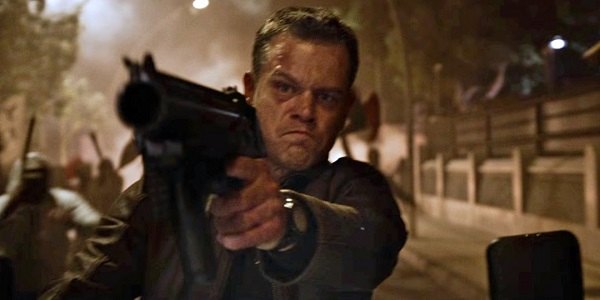
The screenplay for
Jason Bourne was incredibly messy. The original trilogy was a tight series of action-thrillers that tied both Bourne's personal quest to discover who he really is as well as tying it in with a wider story involving the CIA's black ops.
Jason Bourne tries to juggle a number of storylines but they do not fit as in the original trilogy: there is Bourne trying to find out what happened to his dad and why he joined Treadstone, the CIA trying to make dealing with a Social Media tech giant - which is pretty much saying 'this is Facebook' in big red lights - and another super-agent only known as The Asset (Vincent Cassel) having a personal grudge against Bourne. The similarly themed
The Bourne Supremacy was much at tying together Bourne's personal mission of vengeance, finding out about a mission in his past involving a Russian politician, and rogue elements of the CIA trying to frame Bourne - the plot elements did not feel like a jumble as in
Jason Bourne.
Greengrass is politically minded which at times it works against him;
Green Zone is a great example of this as he ranted about how the US handled the invasion of Iraq.
Jason Bourne suffered the same problem, being so overt with its political commentary. There is an unsubtle discussion between Robert Dewey (Tommy Lee Jones), the Director of the CIA, and Aaron Kalloor (Riz Ahmed) - the movie's version of Mark Zuckerberg debating the right to privacy and intelligence services wanting to have unlimited access, while Christian Dassault is basically Julian Assange, a man who runs a WikiLeaks style website that publishes all information and in its owns words uses people i.e. Chelsea Manning. There is nothing wrong with a filmmaker injecting their own political views, but be a bit more subtle about it. Greengrass was also trying too hard to be topical.
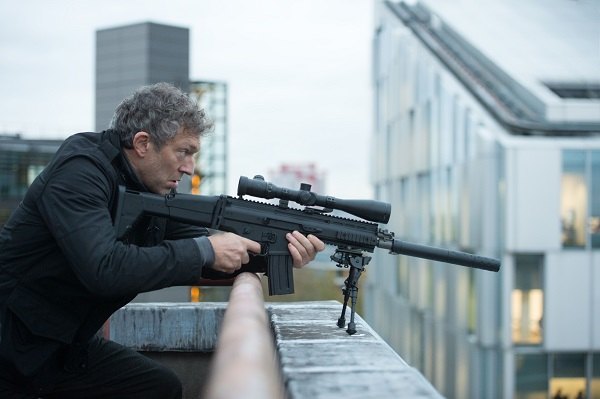
The subplot involving the CIA trying to find a backdoor through a social media website's encryption was similar to the villains' plan in
Captain America: The Winter Soldier and
Spectre and to a lesser extent
Mission: Impossibe - Rogue Nation. The idea of mass surveillance is the go-to plot for spy action-thrillers at the moment.
Greengrass is able to shoot a chase sequence and
Jason Bourne has two impressive sequences, one in Athens during the meeting of an Anarchist riot, the other in Las Vegas. The movie is at its best when it shows Bourne at his resourceful best and playing a game of cat-and-mouse with the CIA. Fans of the series will be happy to see a return of all this spying skulduggery and seeing Bourne use the environment to his adventure. However, Greengrass' love for shaky-cam and quick cutting is also present, a cancer on the action genre because the fight scenes are incomprehensible, made even worst when Bourne has a serious physical challenge. At least other action movies have turned their back on this style of filmmaking.
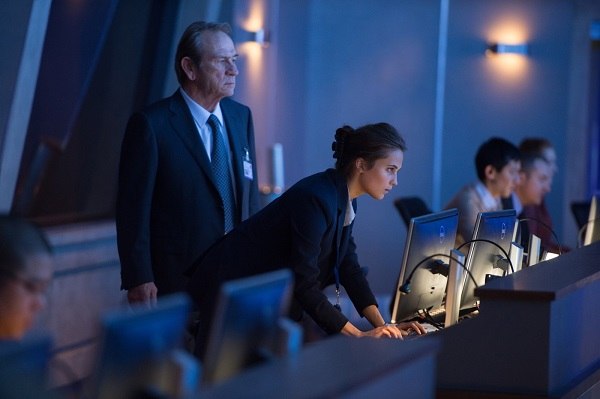
It was reported that Damon only says 25 line in
Jason Bourne (sadly one of them wasn't 'Matt Damon'). Although he is a man of few words Damon as Bourne is still a determined figure and he has more wrinkles and gray hairs. A subtle moment is when Bourne finds a gun in a locker and reluctantly has to accept it and the weight of responsibly it carries.
Except for Julia Stiles as Nicky, the fifth Bourne movie has a new cast. The best of these additions is Cassel's The Asset. The Asset is the most fleshed out assassin since Clive Owen's The Professor in
The Bourne Identity. He was actually a character, a cold assassin who is just as skilled as Bourne and has his own reason to hate the agent. It's just a shame that the character's motivations change midway through the movie through its reveal.
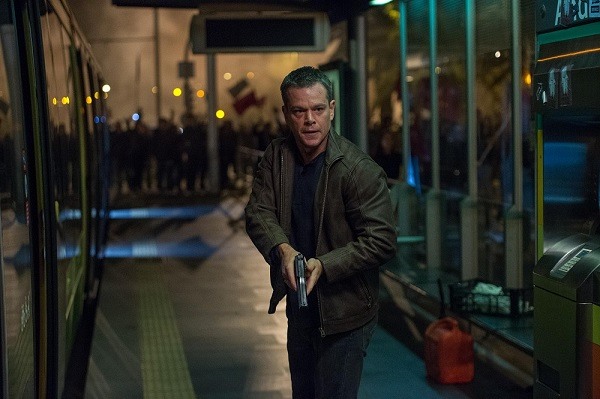
Tommy Lee Jones is his professional self as the big bad CIA director and there is nothing to fault with him. The weak link in the cast was Vikander. Vikander is a talented actress but she was miscast as the head of the CIA's Cyber Division - she was too young to be believed that she could have that kind of role and she could not hide her Swedish accent - which was a distraction.
It is funny how
Jason Bourne treats
The Bourne Legacy, the ugly step child of the series. Except for a quick reference to the Outcome and Larx programmes on a computer screen the spin-off may as well not exist.
Jason Bourne is more-of-the-same. It's satisfies when we see the complex chase sequences in major cities and seeing agents having to think on their feet. Yet it was an unnecessary sequel that is trying to keep a series on life support. It offers nothing new to the series or the character and it will be forgotten compared to the original trilogy.
Pros
- Two excellent car chases
- The Asset is the best CIA assassin since The Professor
- It's more of the same
Cons
- No originality and adds nothing to the series
- Incomphrensive fight scenes
- It's more of the same
 Greengrass once joked that if he did return to the Bourne series it should be called 'The Bourne Redundancy' because there was nowhere the series could go after 'Ultimatum'. There is some truth to that statement because Jason Bourne was a rehash of the previous The Bourne Trilogy. This time Greengrass worked as the co-writer as well director, replacing Tony Gilroy, but the British filmmaker continues with the same themes of Bourne trying to regain his memory and feeling guilty about the actions he has performed - being forced back into the world of espionage despite his protestation and stopping the CIA going beyond its remit to 'protect' America.
Jason Bourne also borrows plot points from the previous movies, like a tragic event that motives Bourne and Alicia Vikander's character of Heather Lee - the head of Cyber Ops being similar to Joan Allen's Pamela Landy, including her character progression. It all helps strike a narrative that the series has run out of ideas and there are no new ideas for progression. The focus on Bourne - and his attempt to regain memory - and to become a one man army paints the series in a corner. The Bond and Mission: Impossible series have many avenues for global trotting adventures, while the works of John le Carré can use real life security issues. In the novels they do have Bourne re-joining the CIA and there are other story ideas available like Bourne working independently but not having to avenge himself against the CIA.
Greengrass once joked that if he did return to the Bourne series it should be called 'The Bourne Redundancy' because there was nowhere the series could go after 'Ultimatum'. There is some truth to that statement because Jason Bourne was a rehash of the previous The Bourne Trilogy. This time Greengrass worked as the co-writer as well director, replacing Tony Gilroy, but the British filmmaker continues with the same themes of Bourne trying to regain his memory and feeling guilty about the actions he has performed - being forced back into the world of espionage despite his protestation and stopping the CIA going beyond its remit to 'protect' America.
Jason Bourne also borrows plot points from the previous movies, like a tragic event that motives Bourne and Alicia Vikander's character of Heather Lee - the head of Cyber Ops being similar to Joan Allen's Pamela Landy, including her character progression. It all helps strike a narrative that the series has run out of ideas and there are no new ideas for progression. The focus on Bourne - and his attempt to regain memory - and to become a one man army paints the series in a corner. The Bond and Mission: Impossible series have many avenues for global trotting adventures, while the works of John le Carré can use real life security issues. In the novels they do have Bourne re-joining the CIA and there are other story ideas available like Bourne working independently but not having to avenge himself against the CIA.
 The screenplay for Jason Bourne was incredibly messy. The original trilogy was a tight series of action-thrillers that tied both Bourne's personal quest to discover who he really is as well as tying it in with a wider story involving the CIA's black ops. Jason Bourne tries to juggle a number of storylines but they do not fit as in the original trilogy: there is Bourne trying to find out what happened to his dad and why he joined Treadstone, the CIA trying to make dealing with a Social Media tech giant - which is pretty much saying 'this is Facebook' in big red lights - and another super-agent only known as The Asset (Vincent Cassel) having a personal grudge against Bourne. The similarly themed The Bourne Supremacy was much at tying together Bourne's personal mission of vengeance, finding out about a mission in his past involving a Russian politician, and rogue elements of the CIA trying to frame Bourne - the plot elements did not feel like a jumble as in Jason Bourne.
Greengrass is politically minded which at times it works against him; Green Zone is a great example of this as he ranted about how the US handled the invasion of Iraq. Jason Bourne suffered the same problem, being so overt with its political commentary. There is an unsubtle discussion between Robert Dewey (Tommy Lee Jones), the Director of the CIA, and Aaron Kalloor (Riz Ahmed) - the movie's version of Mark Zuckerberg debating the right to privacy and intelligence services wanting to have unlimited access, while Christian Dassault is basically Julian Assange, a man who runs a WikiLeaks style website that publishes all information and in its owns words uses people i.e. Chelsea Manning. There is nothing wrong with a filmmaker injecting their own political views, but be a bit more subtle about it. Greengrass was also trying too hard to be topical.
The screenplay for Jason Bourne was incredibly messy. The original trilogy was a tight series of action-thrillers that tied both Bourne's personal quest to discover who he really is as well as tying it in with a wider story involving the CIA's black ops. Jason Bourne tries to juggle a number of storylines but they do not fit as in the original trilogy: there is Bourne trying to find out what happened to his dad and why he joined Treadstone, the CIA trying to make dealing with a Social Media tech giant - which is pretty much saying 'this is Facebook' in big red lights - and another super-agent only known as The Asset (Vincent Cassel) having a personal grudge against Bourne. The similarly themed The Bourne Supremacy was much at tying together Bourne's personal mission of vengeance, finding out about a mission in his past involving a Russian politician, and rogue elements of the CIA trying to frame Bourne - the plot elements did not feel like a jumble as in Jason Bourne.
Greengrass is politically minded which at times it works against him; Green Zone is a great example of this as he ranted about how the US handled the invasion of Iraq. Jason Bourne suffered the same problem, being so overt with its political commentary. There is an unsubtle discussion between Robert Dewey (Tommy Lee Jones), the Director of the CIA, and Aaron Kalloor (Riz Ahmed) - the movie's version of Mark Zuckerberg debating the right to privacy and intelligence services wanting to have unlimited access, while Christian Dassault is basically Julian Assange, a man who runs a WikiLeaks style website that publishes all information and in its owns words uses people i.e. Chelsea Manning. There is nothing wrong with a filmmaker injecting their own political views, but be a bit more subtle about it. Greengrass was also trying too hard to be topical.
 The subplot involving the CIA trying to find a backdoor through a social media website's encryption was similar to the villains' plan in Captain America: The Winter Soldier and Spectre and to a lesser extent Mission: Impossibe - Rogue Nation. The idea of mass surveillance is the go-to plot for spy action-thrillers at the moment.
Greengrass is able to shoot a chase sequence and Jason Bourne has two impressive sequences, one in Athens during the meeting of an Anarchist riot, the other in Las Vegas. The movie is at its best when it shows Bourne at his resourceful best and playing a game of cat-and-mouse with the CIA. Fans of the series will be happy to see a return of all this spying skulduggery and seeing Bourne use the environment to his adventure. However, Greengrass' love for shaky-cam and quick cutting is also present, a cancer on the action genre because the fight scenes are incomprehensible, made even worst when Bourne has a serious physical challenge. At least other action movies have turned their back on this style of filmmaking.
The subplot involving the CIA trying to find a backdoor through a social media website's encryption was similar to the villains' plan in Captain America: The Winter Soldier and Spectre and to a lesser extent Mission: Impossibe - Rogue Nation. The idea of mass surveillance is the go-to plot for spy action-thrillers at the moment.
Greengrass is able to shoot a chase sequence and Jason Bourne has two impressive sequences, one in Athens during the meeting of an Anarchist riot, the other in Las Vegas. The movie is at its best when it shows Bourne at his resourceful best and playing a game of cat-and-mouse with the CIA. Fans of the series will be happy to see a return of all this spying skulduggery and seeing Bourne use the environment to his adventure. However, Greengrass' love for shaky-cam and quick cutting is also present, a cancer on the action genre because the fight scenes are incomprehensible, made even worst when Bourne has a serious physical challenge. At least other action movies have turned their back on this style of filmmaking.
 It was reported that Damon only says 25 line in Jason Bourne (sadly one of them wasn't 'Matt Damon'). Although he is a man of few words Damon as Bourne is still a determined figure and he has more wrinkles and gray hairs. A subtle moment is when Bourne finds a gun in a locker and reluctantly has to accept it and the weight of responsibly it carries.
Except for Julia Stiles as Nicky, the fifth Bourne movie has a new cast. The best of these additions is Cassel's The Asset. The Asset is the most fleshed out assassin since Clive Owen's The Professor in The Bourne Identity. He was actually a character, a cold assassin who is just as skilled as Bourne and has his own reason to hate the agent. It's just a shame that the character's motivations change midway through the movie through its reveal.
It was reported that Damon only says 25 line in Jason Bourne (sadly one of them wasn't 'Matt Damon'). Although he is a man of few words Damon as Bourne is still a determined figure and he has more wrinkles and gray hairs. A subtle moment is when Bourne finds a gun in a locker and reluctantly has to accept it and the weight of responsibly it carries.
Except for Julia Stiles as Nicky, the fifth Bourne movie has a new cast. The best of these additions is Cassel's The Asset. The Asset is the most fleshed out assassin since Clive Owen's The Professor in The Bourne Identity. He was actually a character, a cold assassin who is just as skilled as Bourne and has his own reason to hate the agent. It's just a shame that the character's motivations change midway through the movie through its reveal.
 Tommy Lee Jones is his professional self as the big bad CIA director and there is nothing to fault with him. The weak link in the cast was Vikander. Vikander is a talented actress but she was miscast as the head of the CIA's Cyber Division - she was too young to be believed that she could have that kind of role and she could not hide her Swedish accent - which was a distraction.
It is funny how Jason Bourne treats The Bourne Legacy, the ugly step child of the series. Except for a quick reference to the Outcome and Larx programmes on a computer screen the spin-off may as well not exist.
Jason Bourne is more-of-the-same. It's satisfies when we see the complex chase sequences in major cities and seeing agents having to think on their feet. Yet it was an unnecessary sequel that is trying to keep a series on life support. It offers nothing new to the series or the character and it will be forgotten compared to the original trilogy.
Tommy Lee Jones is his professional self as the big bad CIA director and there is nothing to fault with him. The weak link in the cast was Vikander. Vikander is a talented actress but she was miscast as the head of the CIA's Cyber Division - she was too young to be believed that she could have that kind of role and she could not hide her Swedish accent - which was a distraction.
It is funny how Jason Bourne treats The Bourne Legacy, the ugly step child of the series. Except for a quick reference to the Outcome and Larx programmes on a computer screen the spin-off may as well not exist.
Jason Bourne is more-of-the-same. It's satisfies when we see the complex chase sequences in major cities and seeing agents having to think on their feet. Yet it was an unnecessary sequel that is trying to keep a series on life support. It offers nothing new to the series or the character and it will be forgotten compared to the original trilogy.